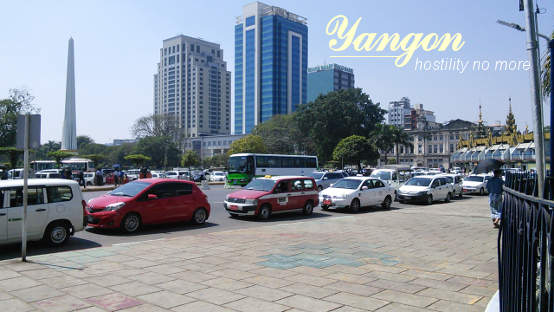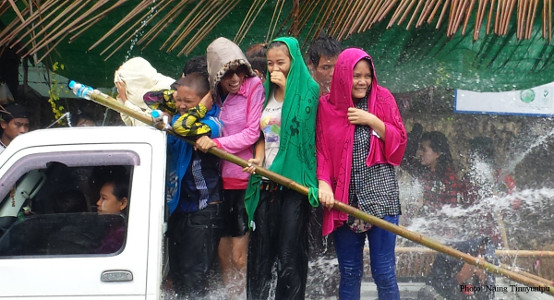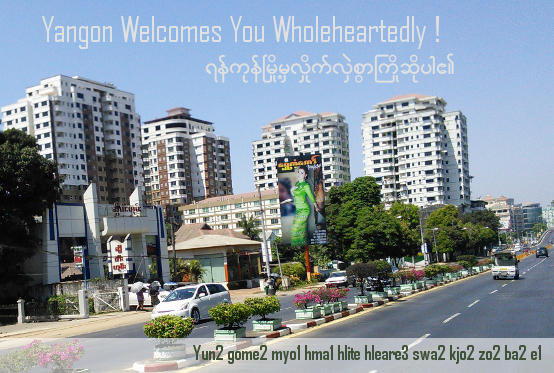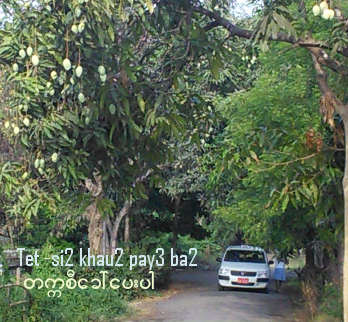Burmese Phrasebook for the Tourists 📖
So far, we have covered a lot of grounds on useful basic Burmese vocabularies, words, and phrases. Although new lessons are added as time goes by, I will keep the Myanmar conversational phrases as simple as possible, so that you can jump in at any lesson without difficulties.
In this lesson, I am going to focus on essential travel phrases for the tourists. Some of the words and phrases are already covered in the previous lessons, so if you have been following me, this will be like a review. For the tourists who discover this page through the Internet search, this lesson will be a useful information put together in one page.
Calling a taxi or a doctor 📞
As a traveler, you definitely need a transport. Although travel agencies like Asia Pearl Travels provide guided tours inclusive of transport, some tourists prefer to make adventures on their own. If you are one of such individuals, you can go to the front desk in your hotel and ask:
တက္ကစီ | tet-si2 — taxi
ခေါ် | khau2 — call
ပေး | pay3 — give
ပါ | ba2 — soft polite tone
တက္ကစီ ခေါ်ပေးပါ | tet-si2 khau2 pay3 ba2 — Can you call a taxi for me, please?
ဆရာဝန် | hsa1-ya2-woon2 — doctor
ခေါ် | khau2 — call
ပေး | pay3 — give
ပါ | ba2 — soft polite tone
You can use the same sentence construction with "doctor" in place of "taxi".
ဆရာဝန် ခေါ်ပေးပါ | hsa1-ya2-woon2 khau2 pay3 ba2 — Can you call a doctor for me, please?
Can you do this for me, please? 🚕
So, the general pattern of making such requests is:
xxxx ပေးပါ | pay3 ba2 where,
xxxx is the action word (verb).
pay3 means to give. In Myanmar grammar, when this word is used as a suffix word after an another verb, it becomes a particle meaning to do something for someone, or on the behalf of someone.
ba2 is a polite ending word which softens the tone, as opposed to a command.
If the request is the first phrase as you approach someone for help, and not in the middle of the conversation, include "for me", or "to me" in the beginning of the phrase.
ကျွန်တော့ | kja1-nau1 — me (male term)
ကို | go2 — roughly means "to" or "for"
xxxx — do something
ပေးပါ | pay3 ba2 — polite ending word.
ကျွန်တော့ကို xxxx ပေးပါ | kja1-nau1 go2 xxxx pay3 ba2 - Please do xxxx for me (male).
ကျွန်မကို xxxx ပေးပါ | kja1-ma1 go2 xxxx pay3 ba2 - Please do xxxx for me (female).
I have covered a list of verbs that you can use in lesson7. For example, you can say,
အဝတ်လျှော်ပေးပါ | a-woot shau2 pay3 ba2 — Can you wash clothes for me, please?
ဒေါ်လာလဲပေးပါ | dau2-la2 leare3 pay3 ba2 — Can you exchange dollar (into kyat) for me, please?
Can you take me to xxxx ? ⛵
The general pattern of making this type of request is:
xxxx ပို့ပေးပါ |
xxxx po1 pay3 ba2
လေယာဉ်ပျံကွင်း | lay2-yin2-byan2 gwin3 — airport (airplane + field) [noun]
ပို့ | po1 — send [verb]
ပေး | pay3 — give [verb]
ပါ | ba2 — soft polite tone [particle]
လေယာဉ်ပျံကွင်း ပို့ပေးပါ | lay2-yin2-byan2 gwin3 po1 pay3 ba2 — Can you take me to the airport, please?
A shorter word for airport is လေဆိပ် | lay2 zate. You will find this word on maps and road signs.The table below is a list of some useful vocabularies that you can substitute in place of the airport.

CLICK TABLE HEADER COLUMNS TO SORT BY ASCENDING OR DESCENDING ORDER OF BURMESE SCRIPT OR ENGLISH.
Shopping and eating out 🍻
ဘယ်လောက်လဲ | beare2 lout leare3 — How much? (how much + ending question word)
ဒါဘယ်လောက်လဲ | da2 beare2 lout leare3 — How much is this? (this + how much + ending question word)
ဘယ်လောက်ကြမလဲ | beare2 lout kja1 ma1-leare3 — How much will it cost? (how much + cost + will + ending question word)
Please refer to lesson 12 for numbers.
Use the phrase xxxx ရမလား | "xxxx ya1 ma1-la3 to ask if something is available or if it is OK to get something done. (Please see lesson 15 for more on ordering food and drinks including restaurant menus.)
ရ |
ya1 - is the verb "to get" or "to obtain" in Burmese grammar, but it can also be roughly translated as an adjective "available". For example
ဘီယာရမလား | be2-ya2 ya1 ma1-la3 - Can I get beer? roughly means: "Is beer available here?"
If someone tries to sell you something that you don't want, say:
မဝယ်သေးဘူး | ma1-weare2 thay3 bu3 — Not buying this time. (negative + buy + still not + negative ending)
How to make a bargain in Burmese? 🉐
There are still many places in Myanmar where you can make a bargain, like souvenir sellers and roadside used books vendors. While there are a good many honest merchants making their decent living, some cannot resist the temptation to hike up the price a little when they see foreigners with lots of cash. What can you do? The small amount of extra money that they ask may mean nothing to you, but it can feed a poor family for a day in this country — just a small input for your consideration. However, if you're certain that the greed is ridiculously high, you can then use the phrase
လျှော့ပါဦး | shau1 ba2 ome3 — Please decrease or reduce a little.
Can I take photo? 📷

ဓါတ်ပုံ | dut-pone2 — photo
ရိုက် | yite — strike (take photo)
လို့ | lo1 — take the course of action
ရ | ya1 — get it done
မ | ma1 — will be
လား | la3 — ending question word
ဓါတ်ပုံရိုက်လို့ရမလား | dut-pone2 yite lo1 ya1 ma1-la3 — Can I take photo?
Looking for a washroom or a toilet 🚹 🚺
ဒီမှာ | de2-hma2 — here (this place + at)
အိမ်သာ | ain2-dtha2 — toilet
ရှိ | shi1 — exist
လား | la3 — ending question word
ဒီမှာ အိမ်သာရှိလား | de2-hma2 ain2-dtha2 shi1 la3 — Is there a toilet here?
အိမ်သာ | ain2-dtha2 — toilet
ဘယ်မှာ | beare2 hma2 — where (where + at)
ရှိ | shi1 — exist
လဲ | leare3 — ending question word for "what", "why", "which", "where", "when", "how", "how many", "how much".
အိမ်သာ ဘယ်မှာရှိလဲ | ain2-dtha2 beare2-hma2 shi1 leare3 — Where is the toilet (or) where can I find the toilet?
(Refer to lesson 5 for location and direction words.)
When will it be? ⌚
ဘယ်တော့ရောက်မလဲ | beare2-dau1 yout ma1-leare3 — When will it or he or she arrive? (when + arrive + will + ?)
ဘယ်တော့လာမလဲ | beare2-dau1 la2 ma1-leare3 — When will you come? (when + come + will + ?)
ဘယ်တော့သွားမလဲ | beare2-dau1 thwa3 ma1-leare3 — When will you go? (when + go + will + ?)
ဘယ်တော့သွားကြမလဲ | beare2-dau1 thwa3 ja1 ma1-leare3 — When will we go? (when + go + plural + will + ?)
Take note that there is no "you" "we" or "it" stated explicitly in the phrases. For the answers to such questions regarding time, please refer to time expressions in lesson 13.
Simple questions using "what", "which", "where", "who", "why", "how", and "how many" ❔ ❔ ❔
ဒါဘာလဲ | da2 ba2 leare3 — What is this? (this + what)
ဘယ်ဟာလဲ | beare2 ha2 leare3 — Which one? (which + object + ?)
ဘယ်မှာလဲ | beare2 hma2 leare3 — Where is it? (where + at + ?)
ဘယ်သူလဲ | beare2 dthu2 leare3 — Who? (which + person + ?)
သူဘဲ | thu2 beare3 — That's him! (he + exactly!)
ဘာဖြစ်လို့လဲ | ba2 pfyit lo1 leare3 — Why?, Why didn't you?, etc.. (what + happen + because + ?)
ဘယ်လိုလဲ | beare2-lo2 leare3 — How did it go? How is it going? (how + ?)
ဒါဘယ်လိုခေါ်လဲ | da2 beare2-lo2 khau2 leare3 — What do you call this in Burmese? (this + how + call + ?)
ဘယ်နှယောက်လဲ | beare2 hna1-yout leare3 — how many persons?
How to say "sorry" in Burmese
Some Burmese authors attempt to translate "sorry" word from English novels as
ဝမ်းနည်းပါတယ် | wun3-neare3 ba2 deare2 - (be sorry + polite + ending word)
When Burmese people hear this phrase, it gets the impression that the speaker is a Westerner. The phrase does not catch on to become a common usage.
The more colloquial phrase for "sorry" as in "I'm sorry to hear that" is
စိတ်မကောင်းပါဘူး | sate ma1-koun3 ba2 bu3 - (mind or spirit + not + good + polite + negative ending word)
When someone accidentally touches an another person, especially to an elder person, Burmese people will say,
ကန်တော့ ကန်တော့ | ga1-dau1 ... ga1-dau1 - (show of respect and/or gratitude). This word is equivalent to "sorry".
Note: Spelled as kun2-tau1 ... kun2-tau1.
Another usage of "sorry" in English is when you did not hear or understand what the other person said, which is like saying
"excuse me, can you say that again?"
ဘယ်လိုလဲ | beare2-lo2 leare3 — how? - (how + ?)
ပြန်ပြောပါဦး | pyan2 pyau3 ba2 ome3 — Can you say that again? - (prefix: "repeat" + speak + polite + ending word)
Excuse me!
If someone is in the way in the crowded place and you don't want to be rude by pushing your way through or wait for the person to get out of the way, you can say this:
နည်းနည်း | neare3-neare3 — a little
လောက် | lout — just about; not exact
နည်းနည်းလောက် | neare3-neare3 lout — Excuse me! Excuse me, please!
This phrase requesting to move a little is often heard on the crowded public buses during the rush hours as people try to shove their way to the exit door.
Meeting, greetings, saying thank you and good-bye
I have already covered basic greetings, meeting, questions and answers in previous lessons, so I will just summarize them here without giving detailed explanations. For details on basic questions and answers, please refer to lesson 2.
နေကောင်းလား | nay2-koun3 la3 — How are you?
တွေ့ | tway1 — meet (verb)
ရတာ | ya1 da2 — as for being able to (particle)
ဝမ်းသာ | wun3-tha2 — be glad(verb) equivalent to happy (adjective in English)
ပါတယ် | ba2 deare2 — polite affirmative ending words. (particle + postpositional marker)
တွေ့ရတာ ဝမ်းသာ ပါတယ် | tway1 ya1 da2 wun3-tha2 ba2 deare2 — Nice to meet you!
နာမည်ဘယ်လိုခေါ်လဲ | nun2-meare2 beare2-lo2 khau2 leare3 — What's your name? - (name + how + call + ?)
အင်္ဂလိပ် | in3-ga1-late — English
စကား | za1-ga3 — spoken language
ပြော | pyau3 — speak, tell, say
တတ် | tut — suffix particle: know how to
သလား | dtha1-la3 — ?
အင်္ဂလိပ် စကား ပြောတတ် သလား | in3-ga1-late za1-ga3 pyau3 tut dtha1-la3 — Can you speak English?
နည်းနည်း | neare3 neare3 — a little
ပြော | pyau3 — speak, tell, say
တတ် | tut — suffix particle: know how to
တယ် | deare2 — affirmation.
နည်းနည်း ပြောတတ်တယ် | neare3 neare3 pyau3 tut deare2 — Yes, I can speak a little.
ကျေးဇူး | kjay3-zu3 — a good deed done on an another person.
တင် | tin2 — to explain the fact as in tin2 pya1
ပါတယ် | ba2 deare2 — polite ending word with emphasis on tin2.
ကျေးဇူးတင်ပါတယ် | kjay3-zu3 tin2 ba2 deare2 — Thank you!
အားနာစရာကြီး | ah3-na2 za1-ya2 ji3 — You are so kind and hospitable!
What does ah3-na2 mean? See lesson 20 for explanation.
ရပါတယ် | ya1 ba2 deare2 — No problem! (can be done + polite + ending word) equivalent to "You're welcome!"
သွားပါဦးမယ် | thwa3 ba2 ome3-meare2 — Good-bye! (go + polite + action to be taken first + ending word indicating future: "will")
နောက်ပြန်တွေ့ကြမယ် | nout pyan2 tway1 ja1 meare2 — See you again! (next time + repeat + see + plural + ending word indicating future: "will")




